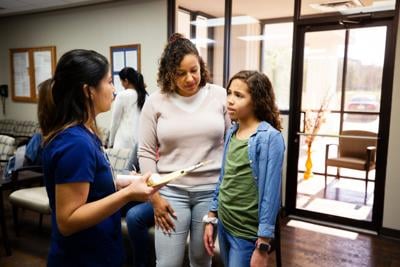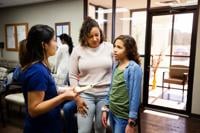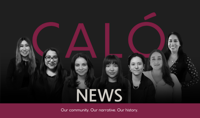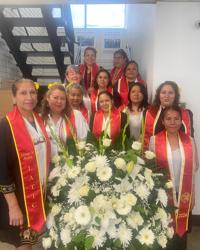I spent the early part of my childhood watching my older sister translate for my parents. She helped them communicate with neighbors, landlords, employers, teachers and others. I remember feeling eager to translate like my sister. As she became more independent and began to work after school, my turn came. I was home and ready to translate for my parents at a moment’s notice.
Sometimes I felt embarrassed or confused. Other times, I had no idea what I was reading and translated English to Spanish like a game of charades, leading with “it’s like…” and listing synonyms, related words or examples from television and movies. My sister and I were praised by our parents for being bilingual, intelligent and helpful, and we were never made to feel guilty when we could not translate something.
The benefits of my childhood translating experiences helped me navigate the college admission process and financial aid system with little help from others. I was surprised to learn that most of my peers didn’t have experience enrolling in health insurance or registering a car and had never heard of the Social Security Administration. I thought everyone tagged along with their parents to the Department of Motor Vehicles, applied for citizenship and filed income taxes.
The peers who did share my affinity for navigating institutional processes and interacting with customer service had also grown up translating for their parents. I found our shared connection of being family interpreters fascinating. In 2013, I decided to pursue a doctoral degree at UCLA in Education to study the experiences of translating childhoods, a phenomenon called child language brokering.
Since my experience was more general, I wanted to learn about childhood experiences translating for specific contexts, such as health. If the words and knowledge from my childhood language brokering experiences hid in my brain for years, unexpectedly appearing to guide me through the maze of different institutions, then maybe someone who grew up translating for health may have a similar experience with health knowledge and institutions.
Over the course of twelve years, I’ve discovered some surprising findings. For example, people do not like it when children translate for health. I was shocked to learn that many people almost immediately worry about children translating for sexual health topics, medical emergencies or medication directions incorrectly.
However, these concerns focus on one extreme of the spectrum of what health involves. Health is a vast concept that includes many safe and low-stake activities and topics like diet, exercise and filling out forms. Children and young people in my research have described translating health documents, including the time and location of appointments. This, too, counts as translating for health.
Despite legal and ethical concerns, it is common for children to translate in medical settings. In my research alone, I have documented the experiences of 26 young people ages ten through 18 and over 120 college-aged young people with childhood experience translating for health. Most have shared that the main reason they interpret in health contexts is because no one else can. There is an intense shortage of professional medical interpreters in the United States.
When medical interpreters aren’t available, many patients and parents face the decision to reschedule a medical appointment to when an interpreter is available and either delay care or receive care immediately with the help of a child language broker. Even bilingual providers sometimes have limited proficiency in the family’s preferred language, prompting child language brokers to step in after a mistranslation or when a provider can’t think of a word.
People often ask, why don’t parents ask for an interpreter? I would argue, however, that the question we need to ask is, why don’t doctors use an interpreter?
Institutions like healthcare aren’t accessible to everyone. The burden is on individuals and families, rather than providers, to advocate for support and equitable access. The consequences of asking for help are cultural, political and practical. From a cultural perspective, language assistance can be framed as special treatment instead of equitable treatment. Politically, asking for language assistance can trigger fears of being identified as an immigrant and treated differently for it, and sometimes even fear of being reported to immigration agencies.
Requesting language assistance often comes with a risk of needing to reschedule or being turned away by health providers. The cost and scarcity of interpreters can mean that patients are asked to reschedule appointments or referred out, delaying care and or compelling the patient to take time away from work. Hence, if a bilingual child is present and the context does not seem too complex, asking them to act as language brokers is a favorable option.
Simply put, children’s language brokering in health is complicated because it is a powerful contribution that may have significant benefits and great risks. The reality is that many health providers skirt their responsibilities or simply do not have the resources to treat linguistically diverse patients and parents.
The current circumstances in healthcare simply create a need for child language brokers, and I worry about children being exploited by healthcare institutions that are legally and ethically expected to provide language support as part of their services. I also worry about the emotional costs of delivering bad news to loved ones or mediating interactions with medical professionals who are culturally insensitive. Still, it is imperative to recognize the benefits of including bilingual children in health contexts.
Children who language broker for health help to empower their families when institutions fail to offer equitable access. They support family health at home and in medical spaces, and they practice and acquire critical linguistic and cultural skills that help them navigate and change the landscape of health and medical spaces.











(0) comments
Welcome to the discussion.
Log In
Keep it Clean. Please avoid obscene, vulgar, lewd, racist or sexually-oriented language.
PLEASE TURN OFF YOUR CAPS LOCK.
Don't Threaten. Threats of harming another person will not be tolerated.
Be Truthful. Don't knowingly lie about anyone or anything.
Be Nice. No racism, sexism or any sort of -ism that is degrading to another person.
Be Proactive. Use the 'Report' link on each comment to let us know of abusive posts.
Share with Us. We'd love to hear eyewitness accounts, the history behind an article.